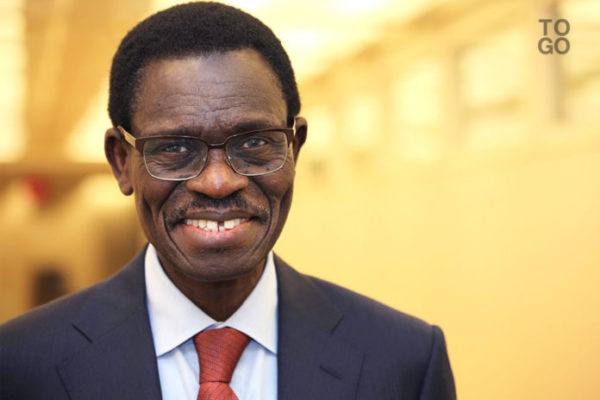After two days of strategic and technical exchanges on “solar energy, its challenges and prospects”, on 14 and 15 November in Lome, in the presence of President Alassane Ouattara of Côte d’Ivoire, the Prime Minister of Togo, the president of the Commission of the West African Economic and Monetary Union (UEMOA) and various institutional actors, the way forward seems clear for the BOAD *.
The West African Development Bank, which celebrated its 45th anniversary in Lomé, capital of Togo, relies on solar energy as an acceleration factor for inclusion and development. “This is not a change of course,” said Christian Adovelande, the president of the institution. The Bank, he explained, remains on its principled stance that investment in quality infrastructure is the bedrock of economic production and development.
This orientation of the BOAD transcends in the outstanding of 5 293.5 billion CFA francs disbursed over the past 45 years in 1,137 projects relating to the construction of roads, bridges, interchanges, power stations and projects. adjudication of drinking water and agriculture.
Since the beginning of its activities, BOAD has drawn 15,130 billion CFA francs to the region, through leverage. President Alassane Ouattara will rightly recall the decisive contribution of the Bank during the construction of the Henri Konan Bedié bridge in Abidjan. The Prime Minister of Togo, Komi Selom Klassou, will insist on the speed in handling the files. “Less than eight months between the reception of the financing project, its release and the actual start”.
This speed coupled with the control of prudential ratios (the bank is rated “Baa1” by Moody’s and “BBB” by Fitch Ratings) and good governance are the DNA of BOAD. Thanks to this rigorous management and the good assessments of the international rating agencies, the Lome-based bank has recently successfully completed two fundraisings on the international financial market for a cumulative amount of 1,600 million dollars or about 900 billion Francs. CFA.
A winning anticipation on solar and renewable energies in general
BOAD was able to anticipate the turn of renewable energies and solar energy in particular, in order to become one of the first African institutions to be approved by the Green Climate Fund (GCF) and, also, the Fund for Climate Change. Global Environment (GEF) and the United Nations Adaptation Fund (FA). “The Bank,” recalls Mr. Adovelande, “integrated environmental and social issues into his operations in 2003, with the vision of working towards natural resources managed for the benefit of clean development and resilient to the horizon by 2020”. climate change in the Member States “.
BOAD has thus been included in the orientations defined at the 2012 Rio summit on sustainable development, by adopting, in 2014, a 2015-2019 Environment and Climate Strategy whose main lines are essentially based on three axes, namely:
-the capacity building of the operational units
-the development of effective tools and mechanisms for financing and mobilizing resources.
-the strengthening of BOAD’s leadership in the region on these issues.
In addition to accreditations in the main climate finance mechanisms, BOAD has been an observer in the United Nations Framework Convention on Climate Change (UNFCCC) since 2009. In addition, the Bank houses a Regional Center. (CRC) set up in partnership with the UNFCCC. This five of the world’s existing centers supports climate action through capacity building, technical assistance and strategic networking.
Mobilization of financing
The Bank’s objective is to make the environment a new growth pole for its actions. Given the potential of UEMOA states and the availability of funding mechanisms, “it is not so much the funds that are lacking that the projects to finance,” notes Christian Adovelande, recalling that the goal of the bank is to increase the mobilization of climate resources to 50 billion FCFA per year by 2021.
Over the last five years, the Bank has provided loans worth 196 billion CFA francs for solar projects. The UEMOA zone has an average sunshine rate of between 5 and 10 hours per day with all the assets needed to attract funding from international funds for renewable energies.
For most of them, WAEMU states have defined solar-powered energy mix projects, but according to the experts present at the forum, they still need to make efforts to harmonize their legislative frameworks in the area of finance. climate. “The mobilization of funding will go through an incentive framework and the ability to mobilize concessional resources,” said Seyni Nafo, Ambassador, Special Adviser to the President of Mali and spokesman for the Africa group at the last COP.
The advantage of solar energy lies in the noticeable drop in the cost of KWH over the last four decades, insists, for its part, Philippe MALBRANCHE, DG, Nat. Solar Energy of France. “The advantage of solar is its price that has fallen in four decades, with levels of 2 to 3 cents euros KWH in sunny countries.” And to draw the audience’s attention to the sensitivity of the cost of solar KWH to the cost of access to capital.
This means that slow tendering procedures, project development time and regulatory risks are important factors in determining the cost of capital and, ultimately, the competitiveness of solar energy. In the future, costs will continue to decline upstream making solar even more accessible even if it remains that, in the current state of technology, the transition from smoothing to storage has areas of uncertainty.
Scratch pad
* BOAD: The West African Development Bank is the common institution of development financing of the States of the West African Monetary Union (WAEMU). The bank was created by an agreement signed on November 14, 1973 and became operational in 1976. The purpose of BOAD under Article 2 of the bylaws is “to promote the balanced development of the Member States and to realize the economic integration of West Africa “, by funding priority development projects.



